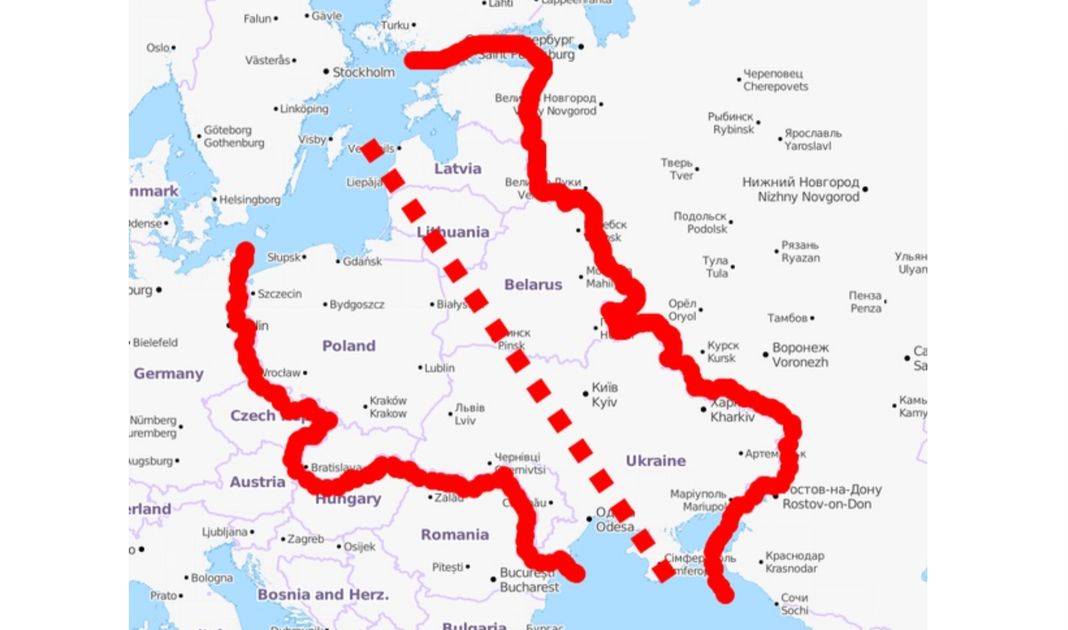Intermarium Weekly 18-25.03.2020

The main trends:
- The virus is slowly affecting the political system and political life;
- The expectations are that all regions will fall into an unprecedented economic depression;
- After an initial stage of “social distancing” between nations, there will likely be a period of restricted foreign travel and foreign economic activities, (freight traffic etc.) with local tourism encouraged;
- Unemployment will soarfor an uncertain length of time and this may create both social and political problems with unprecedented geopolitical consequences;
- China is increasing its help to countries in need, both in Western and Eastern Europe. In the Intermarium region; this represents a continuation (and a strengthening) of China’s existing policy; the long-standing China-CEE Cooperation (17+1) now takes on more attractive perspectives for policymakers in the Middle Kingdom;
Schengen Zone
The head of the Czech Crisis Committee, Roman Primula, said that border restrictions in the Czech Republic due to coronavirus could last up to two years.
This makes for a very disturbing situation in Eastern and Central Europe in terms of unemployment because many who worked in Western Europe are returning to their home-countries, creating a serious burden for the political, social and economic system at a time of overwhelming uncertainty.
China and Eastern Europe: a “Chinese Marshal Plan” for Europe
The US journalist Walter Winchell once said that “a real friend is one who walks in when the rest of the world walks out.” With the West now in a state of near-total paralysis, this is how China is attempting to position itself, with Xi Jinping calling on Western nations “to abandon ideological differences and work together with China in the face of a global emergency,” as the China News Service put it.
This pitches the (historically Americanophile) nations of Eastern Europe back into a fascinating diplomatic tussle for hearts and minds. between Washington and Beijing, which obviously had previous dimensions in terms of “One Belt and One Road” and “5G.” For example, the European Commission’s joint tender for personal protective equipment is dragging, and all countries are looking for an immediate alternative. China is now providing help directly to Italy, Czech Republic, Serbia, Ukraine, Bulgaria, Slovenia, France, Cyprus, and Spain. In some countries, Communist connections play an interesting role (as in Norway, for example). Some have dubbed it the “Health Silk Road.” In the case of the Baltic States, Estonia and Lithuania are holding negotiations for procurement of necessary equipment.China on 14 March organized an international video conference for Central and Eastern Europe which was conducted under China-CEEC (17+1) cooperation that includes 17 countries from the region. Chinese experts shared their own experience with Central and Eastern European medical experts.
On Saturday, Ukrainian An-124 “RUSLAN” transport aircraft landed at Pardubice Airport with five million masks, two million respirators, 120,000 protective suits, 80,000 protective goggles, and tens of thousands of coronavirus tests from Shenzhen, China. The flight cost 35 million koruna, and has been described as one of the largest transports of medical material in the history of the Czech Republic. According to the Minister of the Interior, three flights with similar loads should land two more times, on Tuesday and Friday. From China, the aircraft flew through Myanmar, Bangladesh, India and Pakistan.
The reason for this route is the tense relations between Ukraine and Russia. Ukraine received a similar shipment of medical equipment and masks and is planning to continue purchasing from China in order to fight the virus. To Hungary, on 23 March there arrived an aircraft carrying 11 tons of protective gear from Shanghai. The consignment contained 30,050 protective suits and 82,000 face masks. Budapest’s State Health Centre (ÁEEK) received 20,000 face masks on Monday in a donation financed by the China Construction Bank, which is planning to launch activities in Hungary later this year. Following an agreement between the foreign ministry and the Chinese embassy in Budapest, the masks were transported from Paris to Budapest by road.
This is quite embarrassing for Kiev, especially if we take into account the Ukrainian policies meant to limit Chinese investment in Ukrainian industries. In the case of the Baltic States, the situation has a similar dimension because last month the Chinese Ambassador accused the Baltic nation’s intelligence service of having a “Cold War mindset” for labeling China a threat, warning that its “distorted” conclusions damaged bilateral relations. Now, Estonian officials are indicating that “Estonia hopes to strengthen exchanges and cooperation with China to fight against COVID-19.” The Lithuanian Minister of Health Aurelijus Veryga said that his government was reaching out to China to buy “several hundred” lung ventilators – “We don’t want to wait for joint EU medical supply purchases.”
Romania reacted negatively towards such dependence on China. The Romanian Minister of Economy stated that “This crisis has showed how exposed we are in Romania and in Europe to imports from China.” He added that the government in Bucharest aims to encourage domestic production of healthcare products as a result. However, what if the help from the EU does not come? The Polish government is similarly preparing to receive all necessary medical equipment from China. The American Ambassador in Poland recently criticized the Chinese Government for its policy during the Corona crisis. As the Chinese Ambassador said, when he proposed help to Poland: “Hard times showing you who your real friends are.”
State of Emergency (SE)
In many countries there is now appearing quite an interesting political phenomenon. A State of Emergency because of the Coronavirus was introduced in almost every country of the region, but now political opposition has arisen against the accumulation of power which the State of Emergency gives to the political leadership of the countries. Partially, controversies have arisen over the conditions of the State of Emergency, which imposes severe limitations on the freedom of movement, speech, expression, assembly etc. Since the end of the Second World War, Europe has never witnessed such an attack on democratic values, even though these attacks were seemingly justified by the fight against the Coronavirus. Bulgarian President Rumen Radev partially vetoed a state of emergency law, the introduction of which was proposed to combat the coronavirus. The president criticized the measures provided by law, which restrict the right to freedom of speech and the lack of adequate measures to support the population from poverty. Poverty – as we can see – is already being taken into account, especially in poorer countries. Other examples are Ukraine and Hungary. The Ukrainian political elite is divided over the issue, with the President, the Minister of Health and the Minister of Interior Affairs all proposing severe measures. In the case of Hungary, a State of Emergency according to the Constitution can be established for up to 15 days. However, Victor Orban has been advocating for an indefinite extension. European and Hungarian liberals consider this an attempt to establish a dictatorial order in the country.
“Corona Business”
If for some people the current situation is a tragedy, for others it is opening new “windows” of opportunities. The most involved in this new business are Eastern European countries like Ukraine, Moldova and Bulgaria. The level of crime related to attempts to deliver medical equipment or simply masks to the European Union because of the huge demand and prices is amazingly high. Now this has taken on a systematic character despite Ukrainian Government prohibition. Even Czech Republic was accused for the “apprehension” of 100,000 masks from the Chinese humanitarian help to Italy, but eventually everything was sent to Italy.
Ukraine
According to the rough forecast of the National Academy of Sciences of Ukraine, with a low level of anti-epidemic and preventive measures, 22.2 million people in Ukraine can be infected with the coronavirus.
IMF
Ukraine still hopes to secure external help in order to contain the virus. The main source of promised help is the IMF. Ukraine may receive increased funding from the IMF of up to $10 billion, which will include $5.5 billion over a three-year program and $4.5 billion to help overcome the coronavirus.
Ukrainians in the EU without Schengen
The Prime Minister of Ukraine, Denis Schmigal, and the Prime Minister of Poland, Mateusz Morawiecki, agreed to create a humanitarian corridor for Ukrainians that would stretch from the German border through Poland. Earlier, in connection with the temporary closure of borders, the Polish government, together with LOT, launched the “Flight Home” operation for people who are in other states and want to return to Poland.
Russia and Informational War at the times of Coronavirus
The hacker group “Digital Revolution,” known for hacking alleged contractors of the Federal Security Service of Russia, indicates that the FSB has an order of special services for a new cyber weapon under the code name, “the Fronton Program,” which can organize cyber-attacks on middle-size countries. Ukrainian SBU states that the Russian Special Forces are engaged in the destabilization of the social and political situation in Ukraine and they are trying to create chaos in Ukrainian cities by spreading fake news about the virus.
Autor
Ridvan Bari Urcosta
Senior Analyst at Strategy&Future






Trwa ładowanie...